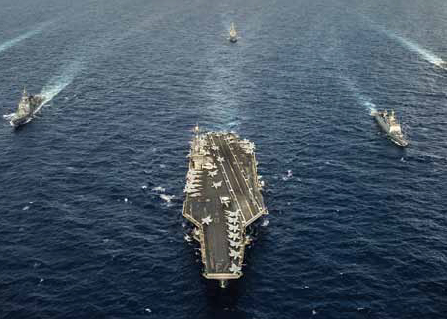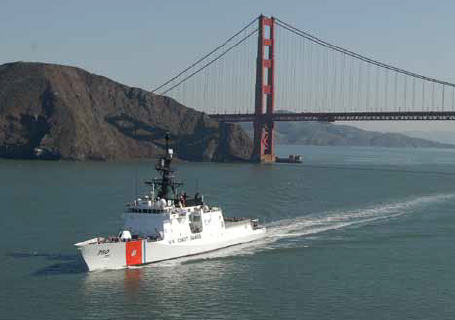REPORTS
Responding to Capability Surprise: A Strategy for U.S. Naval Forces (2013)
U.S. Naval Forces’ Capabilities for Responding to Small Vessel Threats (abbreviated and classified versions, 2013)
Improving the Decision Making Abilities of Small Unit Leaders (2012)
National Security Implications of Climate Change for U.S. Naval Forces (final report, 2011)
National Security Implications of Climate Change for U.S. Naval Forces (letter report, 2010)
Information Assurance for Network-Centric Naval Forces (2010)
Maritime Security Partnerships (2008)
U.S. Conventional Prompt Global Strike: Issues for 2008 and Beyond (2008)
Manpower and Personnel Needs for a Transformed Naval Force (2008)
The Role of Naval Forces in the Global War on Terror (abbreviated and classified versions, 2007)
Distributed Remote Sensing for Naval Undersea Warfare (abbreviated and classified versions, 2007)
Conventional Prompt Global Strike Capability: Letter Report (2007)
Identification of Promising Naval Aviation Science and Technology Opportunities (2006)
C4ISR for Future Naval Strike Groups (2006)
FORCEnet Implementation Strategy (2005)
Sea Basing: Ensuring Joint Force Access from the Sea (2005)
Naval Analytical Capabilities: Improving Capabilities-Based Planning (2005)
Autonomous Vehicles in Support of Naval Operations (2005)

“…the panel found it impossible to think about the core of naval aviation—the carrier and its aircraft —without also thinking about the missiles that are becoming the primary warhead delivery vehicles, the platforms they are launched from, the information network
The Navy’s Needs in Space for Providing Future Capabilities (2005)
The Role of Experimentation in Building Future Naval Forces (2004)
Naval Forces’ Defense Capabilities Against Chemical and Biological Warfare Threats (2004)
2003 Assessment of the Office of Naval Research’s Marine Corps Science and Technology Program (2004)
An Assessment of Non-Lethal Weapons Science and Technology (2003)
An Assessment of Precision Time and Time Interval Science and Technology (2002)
2002 Assessment of the Office of Naval Research’s Air and Surface Weapons Technology Program (2002)
Naval Mine Warfare: Operational and Technical Challenges for Naval Forces (2001)
2001 Assessment of the Office of Naval Research’s Aircraft Technology Program (2001)
Naval Forces’ Capability for Theater Missile Defense (2001)
2000 Assessment of the Office of Naval Research’s Marine Corps Science and Technology Program (2000)
Network-Centric Naval Forces: A Transition Strategy for Enhancing Operational Capabilities (2000)
Review of the Office of Naval Research’s Uninhabited Combat Air Vehicles Program (2000)
An Assessment of Undersea Weapons Science and Technology (2000)
An Assessment of Naval Hydromechanics Science and Technology (2000)
1999 Assessment of the Office of Naval Research’s Air and Surface Weapons Technology Program (1999)
Naval Expeditionary Logistics: Enabling Operational Maneuver From the Sea (1999)
Recapitalizing the Navy: A Strategy for Managing the Infrastructure (1998)
Technology for the United States Navy and Marine Corps, 2000-2035: Becoming a 21st-Century Force (nine volumes, 1997)
Post-Cold War Conflict Deterrence (1997)
Fire Suppression Substitutes and Alternatives to Halon for U.S. Navy Applications (1997)
Naval Research Laboratory Strategic Series (1995-1997)
that ties all these components into a functioning whole, and the aircraft, spacecraft, sensors, and communications links that make up the physical components of that network.”
The Implications of Advancing Technology for Naval Aviation, 1982

The Navy and Marine Corps in Regional Conflict in the 21st Century (1996)
Shipboard Pollution Control: U.S. Navy Compliance with MARPOL Annex V (1996)
Office of Naval Research Opportunities Series (1986-1995)
Letter Report to The Honorable William J. Perry, Issues and Strategies Associated with Protecting the Nation’s Infrastructure (1995)
Information Warfare (U) (classified, 1994)
Naval Communications Architecture (1994)
Letter Report to The Honorable John H. Dalton, Admiral Jeremy M. Boorda, USN, and General Carl E. Mundy, Jr., USMC, Future Role for the Department of the Navy in Space and Space-Related Systems (1994)
Mine Countermeasures Technology (U) (classified, 1993-1994)
Navy-21 Update: Implications of Advancing Technology for Naval Operations in the Twenty-First Century (1993)
Space Support to Naval Tactical Operations (U) (classified, 1993)
Integration of Hard-Kill and Soft-Kill Systems for More Effective Fleet Air Defense (1992)
Carrier-21: Future Aircraft Carrier Technology (U) (overview and classified versions, 1991-1992)
NATO Mine Warfare Trip Report (U) (overview and classified versions, 1991)
Opportunities in Radar and Radar-Related Science and Technology (U) (classified, 1991)
Over the Horizon Targeting (U) (classified, 1991)
Satellite-Submarine Connectivity (U) (classified, 1991)
Navy 21: Implications of Advancing Technology for Naval Operations in the Twenty-First Century (U) (eleven volumes, classified, 1988)
Implications of Future Space Systems for the U.S. Navy (U) (classified, 1988)
Combat Networks for Distributed Naval Forces (U) (classified, 1988)
Surface Ship Countermeasures Against Wake Homing Torpedoes (U) (classified, 1987)

“For the U.S. Navy and the U.S. Marine Corps in particular, experimentation has enabled historical transformations in the fleet…”
The Role of Experimentation in Building Future Naval Forces, 2004
Report of the Mine Warfare Study Group (U) (eleven volumes, classified, 1981-1986)
An Assessment of Computer Science Activities of the Office of Naval Research (1986)
Report of the Advanced Space Systems and Technology Study Group (U) (classified, 1986)
Implications of Existing and Future Space Systems for the U.S. Navy Submarine Force (U) (classified, 1985-1986)
Letter Report to Dr. George A. Keyworth, Presidential Advisor, National Security Implications of U.S. Exclusive Economic Zone Survey Data (1985)
Sensor Panel Reports (U) (classified, 1984-1985)
Space-Based Infrared Technology Assessment (U) (classified, 1985)
Letter Report to Vice Admiral Nils R. Thunman, USN, Impact of Satellites on New Submarine Design (1984)
Superconductive Electronics (1984)
An Assessment of the U.S. Naval Observatory (1984)
Letter Report to Admiral James D. Watkins, USN, Status of the Past, Current, and Future Activities of the Naval Studies Board (1984)
Report of the Panel on the Implications of Future Space Systems for the U.S. Navy (U) (classified, 1980-1983)
Perspectives on Reference Literature for Underwater Acoustics (1983)
The Implications of Advancing Technology for Naval Aviation (1982)
Report of the Workshop on Navy Technical Intelligence (U) (classified, 1981)
Report on Risk Assessment of Space Based Radar (U) (classified, 1980)
Report of the Panel on SSBN Technology (U) (classified, 1980)
A Review of Magnetometer Technology (1979)
Some Possible Contributions of Cryogenic Technology to Inertial Navigation (1978)
Ad Hoc Panel on the Military Implications and Use of Directed Energy Weapons (U) (classified, 1978)
Some Naval Issues and Options in Crisis Management (U) (classified, 1977)

“The forward deployment of U.S. Coast Guard vessels can enhance and strengthen the engagement activities and thus increase the number of partnerships.”
Maritime Security Partnerships, 2008




